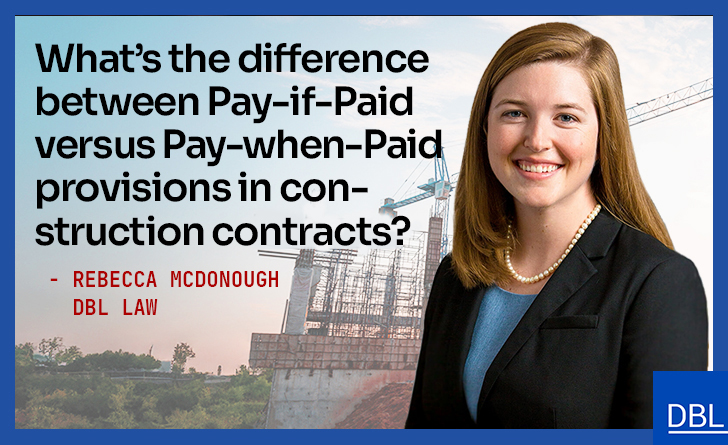The arrival of Spring brings warmer temperatures and better conditions for construction. An important part of any commercial construction contract is payment. General contractors and subcontractors both need to know when they will be paid and what their rights are in the event of nonpayment. Both parties should be mindful of whether their contracts include “pay-if-paid” or “pay-when-paid” provisions. If such language is included, knowing the difference between these two clauses is important.
A pay-if-paid clause shifts the entire risk of the owner’s nonpayment from the general contractor to the subcontractor by making payment to the subcontractor contingent on receiving payment from the owner. Thus, if the subcontract includes a pay-if-paid clause and the owner fails to pay the general contractor, the general contractor is not obligated to pay the subcontractors for any work performed. An example of a pay-if-paid clause is: “All payments by the Contractor to the Subcontractor are expressly and unequivocally contingent upon and subject to the Contractor’s receipt of payment from the Owner for the Subcontract Work.”
In contrast, a pay-when-paid clause addresses the time of the general contractor’s obligation to pay the subcontractor rather than eliminating the obligation to pay entirely. An example of a pay-when-paid clause is: “Within ten (10) days of the Contractor’s receipt of the Progress Payment from the Owner, the Contractor shall pay to the Subcontractor all amounts paid to the Contractor by the Owner for the Subcontract Work.”
Issues tend to arise when the owner’s payment is significantly delayed or never made. However, a subcontractor does not assume the risk of the owner’s nonpayment under a pay-when-paid clause. If payment is not received within a reasonable amount of time, a subcontractor may still be entitled to payment from the general contractor despite a lack of payment from the owner.
Pay-if-paid clauses are expressly illegal or otherwise unenforceable in some states, and courts in those states which still permit these clauses tend to disapprove of them. In Ohio, for example, pay-if-paid clauses are enforceable, but the risk of nonpayment can only be shifted to the subcontractor if the contract clearly and unequivocally expresses that intent of the parties. Because of this high burden and risk of unenforceability, pay-when-paid clauses are increasingly becoming the preferred practice.
The legal implications of pay-if-paid and pay-when-paid clauses are significant. DBL Law’s team of Ohio, Kentucky, and Indiana licensed construction attorneys is ready to prepare, review, and negotiate construction contracts for owners, general contractors, and subcontractors in light of the diverse state-specific requirements.


